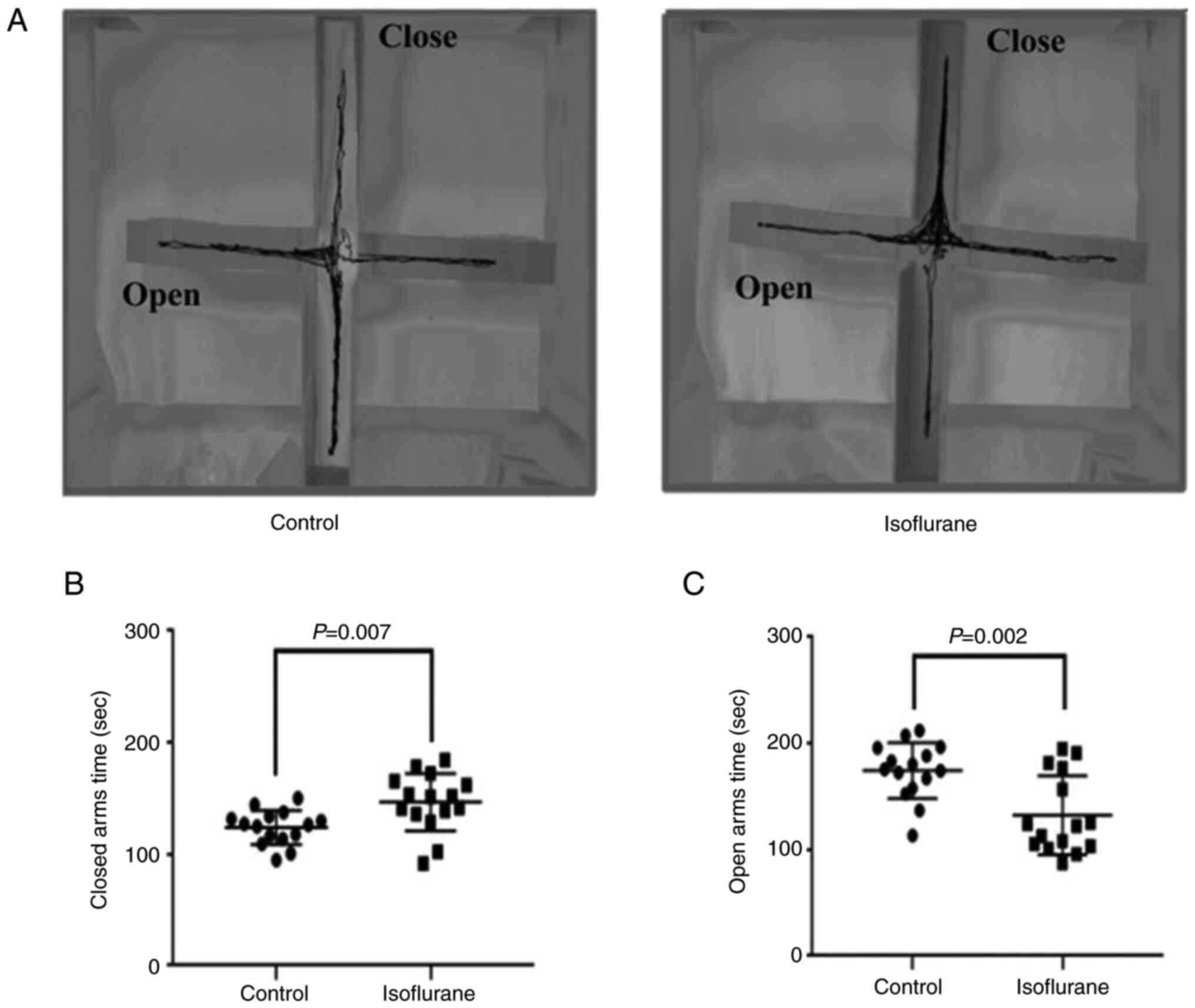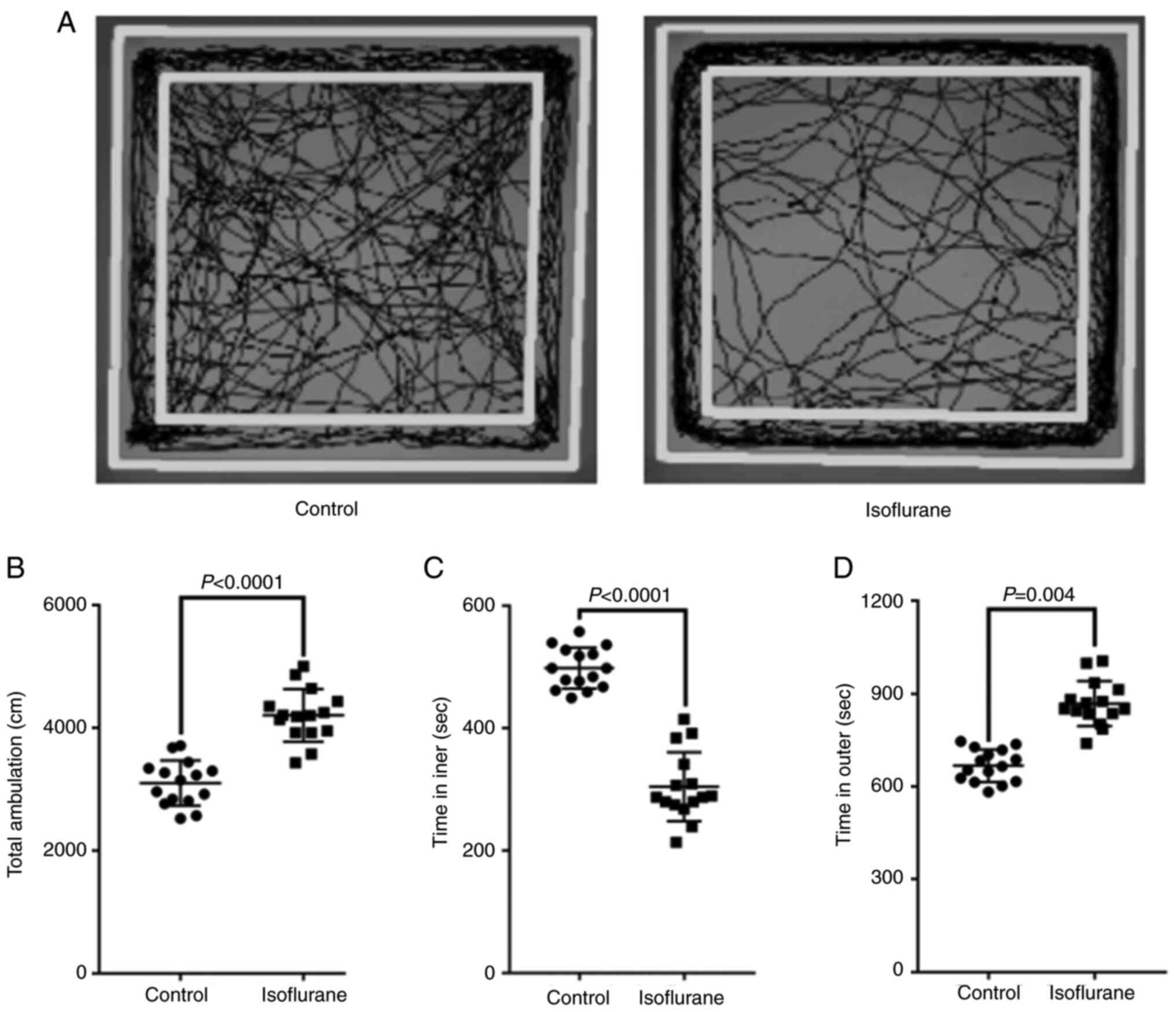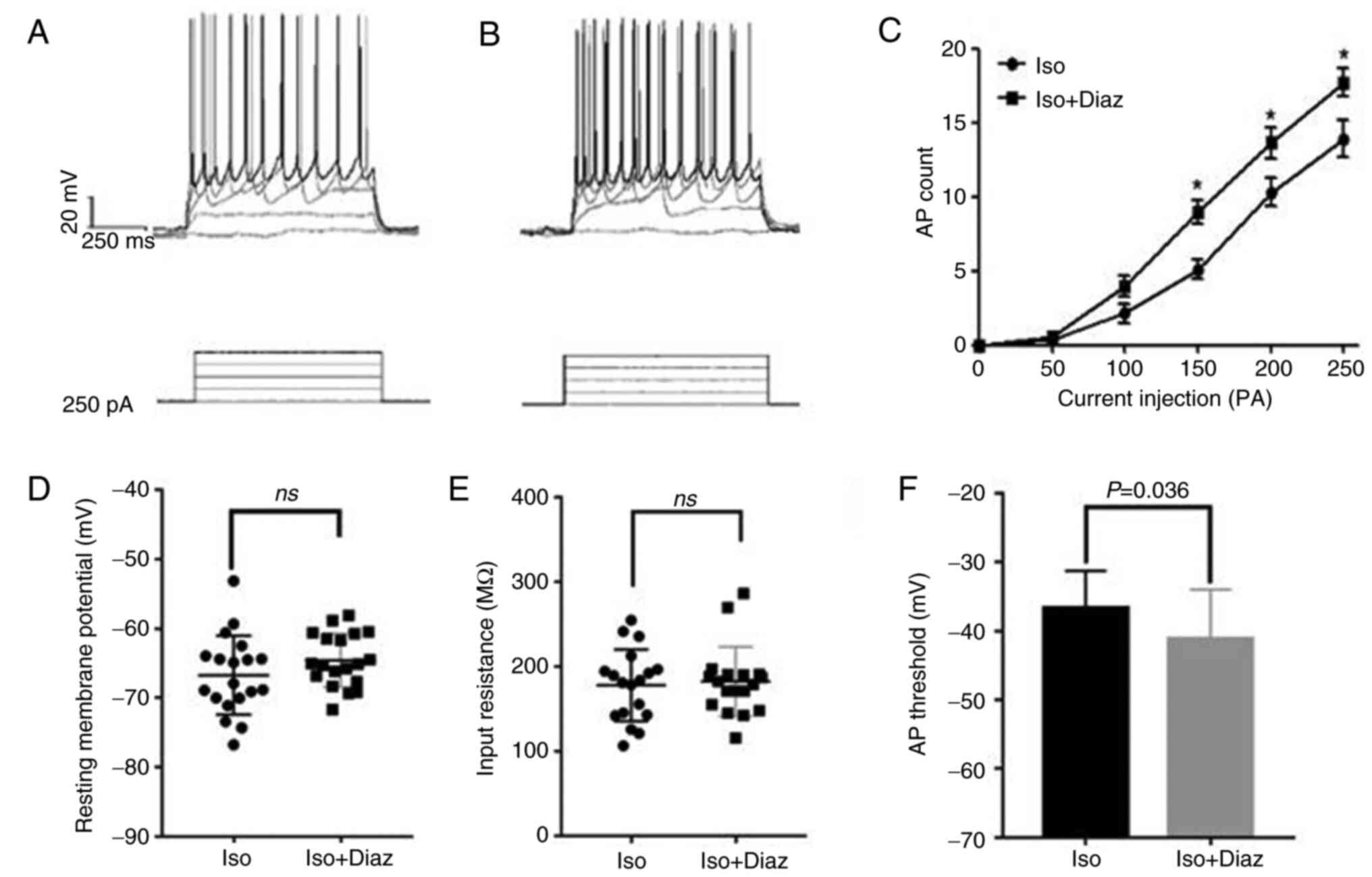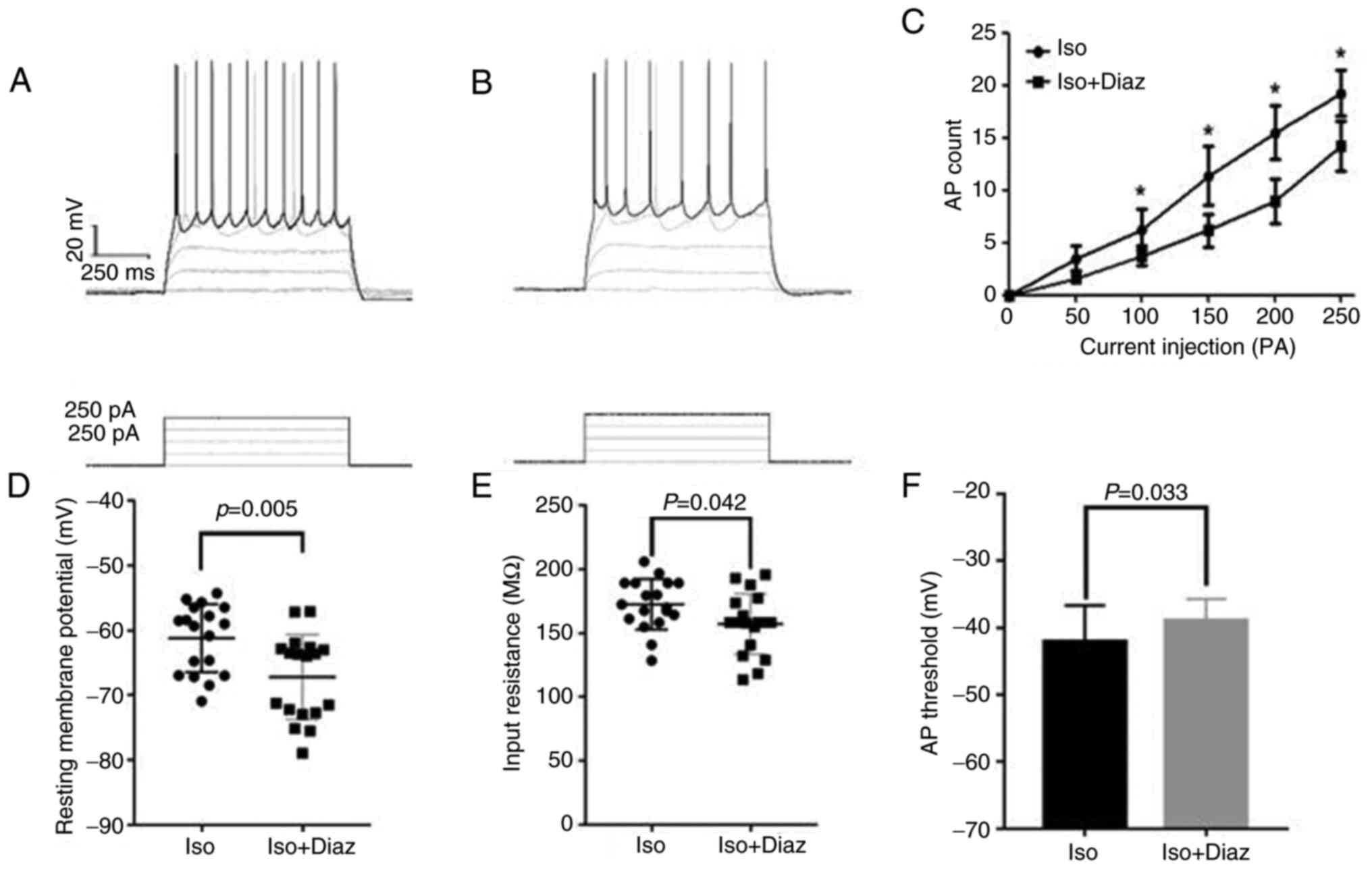|
1
|
Beloeil H, Garot M, Lebuffe G, Gerbaud A,
Laviolle B, Dubout E, Oger S, Nadaud J, Becret A, et al: Balanced
opioid-free anesthesia with dexmedetomidine versus balanced
anesthesia with remifentanil for major or intermediate noncardiac
surgery. Anesthesiology. 134:541–551. 2021.PubMed/NCBI View Article : Google Scholar
|
|
2
|
Wang CM, Chen WC, Zhang Y, Lin S and He
HF: Update on the mechanism and treatment of sevoflurane-induced
postoperative cognitive dysfunction. Front Aging Neurosci.
13(702231)2021.PubMed/NCBI View Article : Google Scholar
|
|
3
|
Lin X, Chen Y, Zhang P, Chen G, Zhou Y and
Yu X: The potential mechanism of postoperative cognitive
dysfunction in older people. Exp Gerontol.
130(110791)2020.PubMed/NCBI View Article : Google Scholar
|
|
4
|
Bruce SL, Ching THW and Williams MT:
Pedophilia-themed obsessive-compulsive disorder: Assessment,
differential diagnosis, and treatment with exposure and response
prevention. Arch Sex Behav. 47:389–402. 2018.PubMed/NCBI View Article : Google Scholar
|
|
5
|
Kozu F, Shirahama-Noda K, Araki Y, Kira S,
Niwa H and Noda T: Isoflurane induces Art2-Rsp5-dependent
endocytosis of Bap2 in yeast. FEBS Open Bio. 11:3090–3100.
2021.PubMed/NCBI View Article : Google Scholar
|
|
6
|
Hao X, Ou M, Zhang D, Zhao W, Yang Y, Liu
J, Yang H, Zhu T, Li Y and Zhou C: The effects of general
anesthetics on synaptic transmission. Curr Neuropharmacol.
18:936–965. 2020.PubMed/NCBI View Article : Google Scholar
|
|
7
|
Yamamoto T, Iwamoto T, Kimura S and Nakao
S: Persistent isoflurane-induced hypotension causes hippocampal
neuronal damage in a rat model of chronic cerebral hypoperfusion. J
Anesth. 32:182–188. 2018.PubMed/NCBI View Article : Google Scholar
|
|
8
|
Chírico MTT, Guedes MR, Vieira LG, Reis
TO, Dos Santos AM, Souza ABF, Ribeiro IML, Noronha SISR, Nogueira
KO, Oliveira LAM, et al: Lasting effects of ketamine and isoflurane
administration on anxiety- and panic-like behavioral responses in
Wistar rats. Life Sci. 276(119423)2021.PubMed/NCBI View Article : Google Scholar
|
|
9
|
Feinstein JS, Gould D and Khalsa SS:
Amygdala-driven apnea and the chemoreceptive origin of anxiety.
Biol Psychol. 170(108305)2022.PubMed/NCBI View Article : Google Scholar
|
|
10
|
Morel C, Montgomery SE, Li L, Durand-de
Cuttoli R, Teichman EM, Juarez B, Tzavaras N, Ku SM, Flanigan ME,
Cai M, et al: Midbrain projection to the basolateral amygdala
encodes anxiety-like but not depression-like behaviors. Nat Commun.
13(1532)2022.PubMed/NCBI View Article : Google Scholar
|
|
11
|
Puggioni P, Pelko M, Rossum MV and Duguid
I: Behavioral state differentially regulates input sensitivity and
firing rates of motor cortex pyramidal neurons. Bmc Neurosci. 14
(Suppl 1)(P114)2013.
|
|
12
|
Perumal MB and Sah P: Inhibitory circuits
in the basolateral amygdala in aversive learning and memory. Front
Neural Circuits. 15(633235)2021.PubMed/NCBI View Article : Google Scholar
|
|
13
|
National Research Council (US): Committee
for the Update of the Guide for the Care and Use of Laboratory
Animals. Guide for the Care and Use of Laboratory Animals, 8th
edition. National Academies Press, Washington, DC, 2011.
|
|
14
|
Kilkenny C, Browne W, Cuthill IC, Emerson
M and Altman DG: NC3Rs Reporting Guidelines Working Group. Animal
research: reporting in vivo experiments: The ARRIVE guidelines. J
Gene Med. 12:561–563. 2010.PubMed/NCBI View Article : Google Scholar
|
|
15
|
Zuo CL, Wang CM, Liu J, Shen T, Zhou JP,
Hao XR, Pan YZ, Liu HC, Lian QQ and Lin H: Isoflurane anesthesia in
aged mice and effects of A1 adenosine receptors on cognitive
impairment. CNS Neurosci Ther. 24:212–221. 2018.PubMed/NCBI View Article : Google Scholar
|
|
16
|
Wang Z, Meng S, Cao L, Chen Y, Zuo Z and
Peng S: Critical role of NLRP3-caspase-1 pathway in age-dependent
isoflurane-induced microglial inflammatory response and cognitive
impairment. J Neuroinflammation. 15(109)2018.PubMed/NCBI View Article : Google Scholar
|
|
17
|
Wang J, Zhu S, Lu W, Li A, Zhou Y, Chen Y,
Chen M, Qian C, Hu X, Zhang Y and Huang C: Varenicline improved
laparotomy-induced cognitive impairment by restoring mitophagy in
aged mice. Eur J Pharmacol. 916(174524)2022.PubMed/NCBI View Article : Google Scholar
|
|
18
|
Rabat Y, Henkous N, Corio M, Nogues X and
Beracochea D: Baclofen but not diazepam alleviates alcohol-seeking
behavior and hypothalamic-pituitary-adrenal axis dysfunction in
stressed withdrawn mice. Front Psychiatry. 10(238)2019.PubMed/NCBI View Article : Google Scholar
|
|
19
|
Rana T, Behl T, Sehgal A, Singh S, Sharma
N, Abdeen A, Ibrahim SF, Mani V, Iqbal MS, Bhatia S, et al:
Exploring the role of neuropeptides in depression and anxiety. Prog
Neuropsychopharmacol Biol Psychiatry. 114(110478)2022.PubMed/NCBI View Article : Google Scholar
|
|
20
|
Jones SK, McCarthy DM, Vied C, Stanwood
GD, Schatschneider C and Bhide PG: Transgenerational transmission
of aspartame-induced anxiety and changes in glutamate-GABA
signaling and gene expression in the amygdala. Proc Natl Acad Sci
USA. 119(e2213120119)2022.PubMed/NCBI View Article : Google Scholar
|
|
21
|
Wang S, Cardieri B, Mo Lin H, Liu X, Sano
M and Deiner SG: Depression and anxiety symptoms are related to
pain and frailty but not cognition or delirium in older surgical
patients. Brain Behav. 11(e02164)2021.PubMed/NCBI View Article : Google Scholar
|
|
22
|
Hem S, Albite R, Loresi M, Rasmussen J,
Ajler P, Yampolsky C, Chabot JD, Gerszten PC and Goldschmidt E:
Pathological changes of the hippocampus and cognitive dysfunction
following frontal lobe surgery in a rat model. Acta Neurochir
(Wien). 158:2163–2171. 2016.PubMed/NCBI View Article : Google Scholar
|
|
23
|
Craske MG and Stein MB: Anxiety. Lancet.
388:3048–3059. 2016.PubMed/NCBI View Article : Google Scholar
|
|
24
|
Zhong J, Li C, Peng L, Pan Y, Yang Y, Guo
Q and Zhong T: Repeated neonatal isoflurane exposure facilitated
stress-related fear extinction impairment in male mice and was
associated with ΔFosB accumulation in the basolateral amygdala and
the hippocampal dentate gyrus. Behav Brain Res.
446(114416)2023.PubMed/NCBI View Article : Google Scholar
|
|
25
|
Liu WZ, Zhang WH, Zheng ZH, Zou JX, Liu
XX, Huang SH, You WJ, He Y, Zhang JY, Wang XD and Pan BX:
Identification of a prefrontal cortex-to-amygdala pathway for
chronic stress-induced anxiety. Nat Commun. 11(2221)2020.PubMed/NCBI View Article : Google Scholar
|
|
26
|
Zheng ZH, Tu JL, Li XH, Hua Q, Liu WZ, Liu
Y, Pan BX, Hu P and Zhang WH: Neuroinflammation induces anxiety-
and depressive-like behavior by modulating neuronal plasticity in
the basolateral amygdala. Brain Behav Immun. 91:505–518.
2021.PubMed/NCBI View Article : Google Scholar
|
|
27
|
Tye KM, Prakash R, Kim SY, Fenno LE,
Grosenick L, Zarabi H, Thompson KR, Gradinaru V, Ramakrishnan C and
Deisseroth K: Amygdala circuitry mediating reversible and
bidirectional control of anxiety. Nature. 471:358–362.
2011.PubMed/NCBI View Article : Google Scholar
|
|
28
|
Babaev O, Piletti Chatain C and
Krueger-Burg D: Inhibition in the amygdala anxiety circuitry. Exp
Mol Med. 50:1–16. 2018.PubMed/NCBI View Article : Google Scholar
|
|
29
|
Prager EM, Bergstrom HC, Wynn GH and Braga
MFM: The basolateral amygdala γ-aminobutyric acidergic system in
health and disease. J Neurosci Res. 94:548–567. 2016.PubMed/NCBI View Article : Google Scholar
|
|
30
|
Lee SC, Amir A, Haufler D and Pare D:
Differential recruitment of competing valence-related amygdala
networks during anxiety. Neuron. 96:81–88.e5. 2017.PubMed/NCBI View Article : Google Scholar
|
|
31
|
Hemmings HC Jr, Akabas MH, Goldstein PA,
Trudell JR, Orser BA and Harrison NL: Emerging molecular mechanisms
of general anesthetic action. Trends Pharmacol Sci. 26:503–510.
2005.PubMed/NCBI View Article : Google Scholar
|
|
32
|
Krasowski MD and Harrison NL: General
anaesthetic actions on ligand-gated ion channels. Cell Mol Life
Sci. 55:1278–1303. 1999.PubMed/NCBI View Article : Google Scholar
|
|
33
|
Ranft A, Kurz J, Deuringer M, Haseneder R,
Dodt HU, Zieglgänsberger W, Kochs E, Eder M and Hapfelmeier G:
Isoflurane modulates glutamatergic and GABAergic neurotransmission
in the amygdala. Eur J Neurosci. 20:1276–1280. 2004.PubMed/NCBI View Article : Google Scholar
|
|
34
|
Long Ii RP, Aroniadou-Anderjaska V, Prager
EM, Pidoplichko VI, Figueiredo TH and Braga MF: Repeated isoflurane
exposures impair long-term potentiation and increase basal
GABAergic activity in the basolateral amygdala. Neural Plast.
2016(8524560)2016.PubMed/NCBI View Article : Google Scholar
|
|
35
|
Wesołowska A: Potential role of the 5-HT6
receptor in depression and anxiety: An overview of preclinical
data. Pharmacol Rep. 62:564–577. 2010.PubMed/NCBI View Article : Google Scholar
|
|
36
|
Tong X, Zhang Z, Zhu J, Li S, Qu S, Qin B,
Guo Y and Chen R: A comparison of epileptogenic effect of status
epilepticus treated with diazepam, midazolam, and pentobarbital in
the mouse pilocarpine model of epilepsy. Front Neurol.
13(821917)2022.PubMed/NCBI View Article : Google Scholar
|
|
37
|
Kasaragod VB, Malinauskas T, Wahid AA,
Lengyel J, Knoflach F, Hardwick SW, Jones CF, Chen WN, Lucas X, El
Omari K, et al: The molecular basis of drug selectivity for α5
subunit-containing GABAA receptors. Nat Struct Mol Biol.
30:1936–1946. 2023.PubMed/NCBI View Article : Google Scholar
|
|
38
|
Courtney CD, Sobieski C, Ramakrishnan C,
Ingram RJ, Wojnowski NM, DeFazio RA, Deisseroth K and
Christian-Hinman CA: Optoα1AR activation in astrocytes modulates
basal hippocampal synaptic excitation and inhibition in a
stimulation-specific manner. Hippocampus. 33:1277–1291.
2023.PubMed/NCBI View Article : Google Scholar
|




















